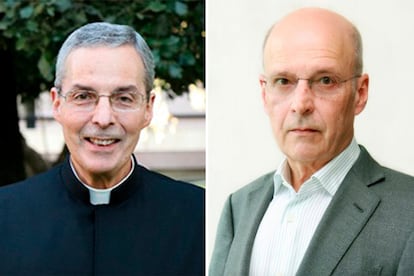Oil exploration, artificial intelligence and dietary supplements: The exotic businesses linked to Mexico’s Legionaries of Christ
Members of the Roman Catholic religious order operated an offshore scheme that invested at least $18.5m in a portfolio across the country

Members and supporters of the Legionaries of Christ, the controversial Roman Catholic religious order established in Mexico, have set up an offshore scheme over the last decade that moved millions of pesos in Mexico. Under an elaborate structure they hid companies under other companies as if they were Russian dolls, with the aim of hiding the fact that the beneficiary of all of those businesses was one of the most powerful religious orders in the world. The Pandora Papers, the latest batch of leaked documents to which the International Consortium of Investigative Journalists (ICIJ) has had access, and a project in which EL PAÍS has taken part, reveals how the companies that they used invested at least $18.5 million (383 million pesos) in an exotic portfolio in Mexico, which included everything from oil exploration and dietary supplements, to investment funds specializing in artificial intelligence and movie production.
The network of trusts and subsidiaries set up by priests and businessmen close to the congregation moved as much as $295 million across four continents. Two companies based in the United Kingdom were in charge of commercial operations. Their cash flow came from interest-free loans made by AlfaOmega Trust and Salus Trust, two trusts opened in New Zealand by the longtime financial planner of the Legion, Luis Garza Medina, and two of his brothers. The end beneficiary of the scheme, and which received the profits, was a third trust created by the religious order, according to more than a thousand emails and contracts reviewed as part of this investigation. The Legionaries of Christ deny controlling the trusts that made the investments, and only admit to having control over the third entity (RMCT), which received all the profits. They assert that it is incorrect to describe them as responsible for the movement of funds.
The money flowed through Swiss bank accounts to investments mainly in Mexico and the United States. One of the subsidiaries used, AOG Investments, reported investing some $20.2 million in Mexican companies until 2019, according to filings in the United Kingdom. Appearing on the list is the Unión de Créditos Industriales de Nuevo León – a kind of industrial credit union in northern Mexico – as well as companies that offer mortgages or home-development projects for seniors throughout the country. Neither the Legionaries of Christ nor the trustees have been willing to clarify whether these movements were reported to the Mexican tax authorities.
Financial reports also break down the amount invested in each project. The largest investment made until that year was in Jaguar Holding. Dedicated to oil exploration, this Mexican company was created in February 2012, a few months after the formation of the trusts in New Zealand. All the names registered as part of Jaguar Holding are relatives of Garza Medina, the congregation’s finance chief. His brother, the businessman Dionisio Garza Medina, who collected donations for the congregation for years, also appears as president of Jaguar Holding, according to the firm’s articles of incorporation. The company currently boasts 60 oil wells, according to its website, employs more than 200 workers, and has a presence in all the Gulf of Mexico states. “We have the potential to become the largest and most diversified private onshore exploration, development and production company in Mexico,” the website states.

On November 4, 2016, these trusts with links to the Legionaries undertook a $60,000 investment in a project named Jaguar Energía. The venture “involves the exploration of oil wells in Trinidad and Tobago,” according to the document. It was not the only investment this Mexican company made, and in fact these repeated every three or four months over several years in varying amounts. In total, the trusts put more than $6.8 million in the Garza Medinas’ family firm.
A spokesperson for Dionisio Garza Medina said that the businessman “cannot comment on private family decisions,” but noted that AlfaOmega was created to “support retired and needy priests and consecrated Catholics, as well as to support social, charitable and spiritual projects based on Catholic teachings.” However, the spokesperson admitted, Dionisio Garza Medina’s relationship with the Legionaries of Christ, the beneficiary of his trust, was limited to the fact that his brother is a priest in the congregation.
Money from the wider offshore structure always circulated in the same way, and many of the investments went into the pockets of members of the congregation or Regnum Christi, the Legionaries’ lay movement. In December 2018, a financial advisor made an investment recommendation to put two million pesos ($97,500) in 123Mobilité, a medical services company specializing in physical rehabilitation. According to public records, 40% of the shares of that company belong to another company owned by Luis Garza Medina’s sister and her husband, who are active members of the Legionary movement. By 2019, the subsidiary had injected at least 6.5 million pesos ($317,000) into 123Mobilité.
Around the same time, 1.2 million pesos ($58,500) was invested in Rubik Venture, a Mexican investment fund mainly dedicated to technology, artificial intelligence and the Internet of Things. Up until 2019, the total amount invested in that company exceeded $100,000, according to financial filings in the UK. Dietary supplements also captured the attention and the money of the offshore structure. Nutrición Para Tu Vida Plena, a Monterrey company that sells multivitamins and flavored proteins, received 3.3 million pesos ($160,000) of investment.
The offshore companies created by the Garza Medina family also invested in Villa Plata, a residence for senior citizens in Guadalajara. There at least 650,000 pesos (nearly $32,000) and behind the companies that executed the operation were the relatives of Garza Medina once more. Although these same names reappear over and over again, a spokesperson for Luis Garza Medina said neither he nor his family can access the offshore companies’ capital, and nor do they control where and in what sums money is invested.
Names are repeated in the Russian Doll companies. Some of the investments, for example, were made through a fund based in Monterrey, whose director had founded several companies used to move the money. Businessman Marcelo Benítez Albo, according to a website, was in charge of the finances of an organization that “manages more than 150 schools and 20 universities in 23 countries,” in reference to the Legion of Christ’s education network. In addition, Benítez Albo was “founder and member of the advisory board of Fidelis International Institute,” referring to the business ethics institute used to recruit benefactors for the Legion. Benítez Albo, who claims not to be a member of the Legion, is one of the operators of its multi-million offshore structure. When contacted, the businessman avoided clarifying his relationship with the Legionaries of Christ, but conceded that Fidelis was founded in 2005 on an ethos of investments with an “ethical filter based on Judeo-Catholic principles”.
Despite the varied nature of the portfolio, education and culture always had a privileged role. In December 2018, for example, the trusts linked to the Legionaries of Christ invested one million pesos ($48,723) in Tilma Films, a Spanish-Mexican movie production company. The money was used to make the movie Tepeyac, an animated film about the Virgin of Guadalupe and Juan Diego, a Mexican-Indian canonized in 2002, according to a document detailing the investment. These financial commitments in Mexico were often related to educational projects — an inexhaustible source of support in the history of the Legion of Christ.
Spencer Woodman (ICIJ), Andrea Cárdenas (Quinto Elemento Lab), Mathieu Tourliere (Proceso), Leo Sisti (L’Espresso) collaborated in this investigation.
Tu suscripción se está usando en otro dispositivo
¿Quieres añadir otro usuario a tu suscripción?
Si continúas leyendo en este dispositivo, no se podrá leer en el otro.
FlechaTu suscripción se está usando en otro dispositivo y solo puedes acceder a EL PAÍS desde un dispositivo a la vez.
Si quieres compartir tu cuenta, cambia tu suscripción a la modalidad Premium, así podrás añadir otro usuario. Cada uno accederá con su propia cuenta de email, lo que os permitirá personalizar vuestra experiencia en EL PAÍS.
¿Tienes una suscripción de empresa? Accede aquí para contratar más cuentas.
En el caso de no saber quién está usando tu cuenta, te recomendamos cambiar tu contraseña aquí.
Si decides continuar compartiendo tu cuenta, este mensaje se mostrará en tu dispositivo y en el de la otra persona que está usando tu cuenta de forma indefinida, afectando a tu experiencia de lectura. Puedes consultar aquí los términos y condiciones de la suscripción digital.









































